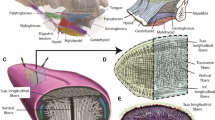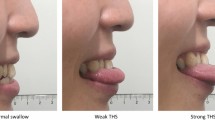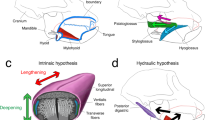Abstract
Previous literature on tongue-jaw relationships during swallowing has focused on behaviors observed with chewable solid foods. The present investigation was undertaken to evaluate both the nature and stability of coordinative relationships between the jaw and three points located along the midsagittal groove of the tongue—anterior (blade), middle (body), and posterior (dorsum)—during swallowing of thin and honey-thick liquids. A reiterative swallowing paradigm was used, with two task conditions (discrete and sequential), to explore the stability of tongue-jaw coordination across different frequencies of swallowing. Eight healthy participants in two age groups (young, older) performed sets of repeated swallows. Tongue and jaw movements were measured using electromagnetic midsagittal articulography. The data were analyzed in terms of variability in the spatiotemporal movement pattern for each fleshpoint of interest, and the temporal coupling (frequency entrainment) and relative phasing of movement for each tongue segment compared to the mandible. The results illustrate a stereotypical but not invariant sequence of movement phasing in the tongue-jaw complex during liquid swallowing and task-related reductions in variability at higher frequencies of swallowing in tongue dorsum movements. This evidence supports the idea that different segments of the tongue couple with the jaw as a synergy for swallowing, but can modify their coupling relationship to accommodate task demands.








Similar content being viewed by others
References
Hiiemae KM, Hayenga S, Reese A: Patterns of jaw and tongue movement in the macaque: a cinefluorographic study. Arch Oral Biol 40:229–246, 1995
Mioche L, Hiiemae KM, Palmer JB: A postero-anterior videofluorographic study of the intra-oral management of food in man. Arch Oral Biol 47: 267–280, 2002
Palmer JB, Hiiemae KM, Liu J: Tongue-jaw linkages in human feeding: a preliminary videofluorographic study. Arch Oral Biol 42:429–441, 1997
Hiiemae KM, Palmer JB: Food transport and bolus formation during complete feeding sequences on foods of different initial consistency. Dysphagia 14:31–42, 1999
Gurfinkel V, Cordo P: The scientific legacy of Nikolai Bernstein. In: Latash ML (ed.): Progress in motor control: Bernstein’s traditions in movement studies. Champaign, IL: Human Kinetics, 1988, pp 1–21
Kelso JAS: Dynamic patterns: The self-organization of brain and behavior. Cambridge, MA: The MIT Press, 1995
Kelso JAS: From Bernstein’s physiology of activity to coordination dynamics. In: Latash ML (ed.): Bernstein’s traditions in movement studies. Champaign, IL: Human Kinetics, 1998
Turvey MT, Carello C, Nam-Gyoon K: Links between active perception and the control of action. In: Haken H, Stadler M (eds.): Synergetics of cognition. Proceedings of the international symposium at Schloss Elmau, Bavaria, June 4-8, 1989. Berlin: Springer, 1990, pp 269–295
Kelso JAS, Saltzman EL, Tuller B: The dynamical perspective on speech production: Data and theory. J Phonet 14:29–59, 1986
Alfonso P, Van Lieshout PHHM: Spatial and temporal variability in obstruent gestural specification by stutterers and controls: Comparisons across sessions. In: Speech production: Motor control, brain research and fluency disorders. Amsterdam, Elsevier, 1997, pp 151–160
Sawczuk A, Mosier KM: Neural control of tongue movement with respect to respiration and swallowing. Crit Rev Oral Biol Med 12:18–37, 2001
Miller JL, Watkin KL, Chen MF: Muscle, adipose and connective tissue variations in intrinsic musculature of the adult human tongue. J Speech Lang Hear Res 45:51–65, 2002
Takemoto H: Morphological analyses of the human tongue musculature for three-dimensional modeling. J Speech Lang Hear Res 44:95–107, 2001
Perrier P, Loevenbruck H, Payan Y: Control of tongue movements in speech: The Equilibrium Point Hypothesis perspective. J Phonet 24:53–75, 1996
Napadow V, Chen Q, Wedeen V, Gilbert R: Characterization of lingual mechanics during swallowing by strain mapping with tagging MRI. Department of Mechanical Engineering, Massachusetts Institute of Technology, 1998
Honda K: Organization of tongue articulation for vowels. J Phonet 24:39–52, 1996
Maeda S: Compensatory articulation during speech: Evidence from the analysis and synthesis of vocal-tract shapes using an articulatory model. In: Hardcastle WJ, Marchal A (eds.): Speech Production and Speech Modelling. Dordrecht: Kluwer Academic Publishers, 1990, pp 131–149
Wilhelms-Tricarico R: Physiological modeling of speech production: methods for modeling of soft-tissue articulators. J Acoust Soc Am 97:3085–3098, 1995
Wilhelms-Tricarico R: A biomechanical and physiologically-based vocal tract model and its control. J Phonet 24:23–28, 1996
Wilhelms-Tricarico R: Development of a tongue and mouth floor model for normalization and biomechanical modeling. Bavaria: Kloster Seeon, 2000, pp 141–144
Sanguineti V, Laboissiere R, Payan Y: A control model of human tongue movements in speech. Biol Cybern 77:11–22, 1997
Stone M, Dick D, Douglas AS, Davis EP, Ozturk C: Modelling the internal tongue using principal strains. Bavaria: Kloster Seeon, 2000, pp 133–136
Martin RE: A comparison of lingual movement in swallowing and speech production. Madison, WI: University of Wisconsin-Madison, 1991
Tasko SM, Kent RD, Westbury JR: Variability in tongue movement kinematics during normal liquid swallowing. Dysphagia 17:126–138, 2002
Hiiemae KM, Palmer JB: Tongue movements in feeding and speech. Crit Rev Oral Biol Med 14:413–429, 2003
Gay T, Rendell JK, Spiro J: Oral and laryngeal muscle coordination during swallowing. Laryngoscope 104:341–349, 1994
Steele CM, Van Lieshout PH: Use of electromagnetic midsagittal articulography in the study of swallowing. J Speech Lang Hear Res 47:342–352, 2004
Steele CM, Van Lieshout PH: Influence of bolus consistency on lingual behaviors in sequential swallowing. Dysphagia 19:192–206, 2004
Hamlet SL: Dynamic aspects of lingual propulsive activity in swallowing. Dysphagia 4:136–145, 1989
Hamlet SL, Stone M, Shawker TH: Posterior tongue grooving in deglutition and speech: preliminary observations. Dysphagia 3:65–68, 1988
Napadow VJ, Chen Q, Wedeen VJ, Gilbert RJ: Biomechanical basis for lingual muscular deformation during swallowing. Am J Physiol 277:G695–G701, 1999
Napadow VJ, Chen Q, Wedeen VJ, Gilbert RJ: Intramural mechanics of the human tongue in association with physiological deformations. J Biomech 32:1–12, 1999
Kahrilas PJ, Lin S, Chen J, Logemann JA: Three-dimensional modeling of the oropharynx during swallowing. Radiology 194:575–579, 1995
Kahrilas PJ, Lin S, Logemann JA, Ergun GA, Facchini F: Deglutitive tongue action: volume accommodation and bolus propulsion. Gastroenterology 104:152–162, 1993
Tasko SM, Westbury JR: Defining and measuring speech movement events. J Speech Lang Hear Res 45:127–142, 2002
Sanguineti V, Laboissiere R, Ostry DJ: A dynamic biomechanical model for neural control of speech production. J Acoust Soc Am 103:1615–1627, 1998
Perkell JS: Properties of the tongue help to define vowel categories: Hypotheses based on physiologically-oriented modeling. J Phonet 24:3–22, 1996
Perkell JS, Zandipour M: Economy of effort in different speaking conditions. II. Kinematic performance spaces for cyclical and speech movements. J Acoust Soc Am 112:1642–1651, 2002
Beek PJ, Peper CE, Stegeman DF: Dynamical models of movement coordination. Human Movement Sci 14:573–608, 1995
Beek PJ, Peper CE, Daffertshofer A: Modeling rhythmic interlimb coordination: beyond the Haken-Kelso-Bunz model. Brain Cogn 48:149–165, 2001
Kelso JAS: Principles of dynamic pattern formation and change for a science of human behavior. In: Bergman L, Cairns R, Nilsson L, Nystedt I (eds.): Developmental science and the holistic approach. Mahwah, NJ: Erlbaum, 2000, pp 63–84
van Lieshout PH, Hulstijn W, Alfonson PJ, Peters HFM: Higher and lower order influences on the stability of the dynamic coupling between articulators. In: Hulstijn W, Peters HFM, van Lieshout PH (eds.): Speech production: motor control, brain research, and fluency disorders. Amsterdam: Elsevier, 1997, pp 191–170
Adams SG, Weismer G, Kent RD: Speaking rate and speech movement velocity profiles. J Speech Hear Res 36:41–54, 1993
Warren WHJ: Critical behavior in perception-action systems. In: Kelso JAS, Mandell AJ, Schlesinger MF (eds.): Dynamic patterns in complex systems. Singapore: World Scientific, 1988, pp 370–387
Chi-Fishman G, Sonies BC: Effects of systematic bolus viscosity and volume changes on hyoid movement kinematics. Dysphagia 17: 278–287, 2002
Chi-Fishman G, Sonies BC: Kinematic strategies for hyoid movement in rapid sequential swallowing. J Speech Lang Hear Res 45:457–468, 2002
Chi-Fishman G, Sonies BC: Motor strategy in rapid sequential swallowing: new insights. J Speech Lang Hear Res 43:1481–1492, 2000
Chi-Fishman G, Stone M, McCall GN: Lingual action in normal sequential swallowing. J Speech Lang Hear Res 41:771–785, 1998
Van Lieshout PHHM: Dynamical systems theory and its application in speech. In: Maassen B, Kent R, Peters HFM, Van Lieshout PHHM, Hulstijn W (eds.): Speech Motor Control in Normal and Disordered Speech. Oxford, UK: Oxford University Press, 2004
Steele CM: Kinematics and coordinative dynamics of normal human swallowing. Graduate Department of Speech-Language Pathology, University of Toronto, 2003
Gay T, Rendell JK, Spiro J, Mosier K, Lurie AG: Coordination of oral cavity and laryngeal movements during swallowing. J Appl Physiol 77:357–365, 1994
Treffner PJ, Peter M: Intentional and attentional dynamics of speech-hand gestural coordination. Human Movement Science. Hum Mov Sci 21:641–697, 2003
Peper CE, Beek PJ, van Wieringen PC: Frequency-induced phase transitions in bimanual tapping. Biol Cybern 73:301–309, 1995
Aoyagi N, Ohashi K, Yamamoto Y: Frequency characteristics of long-term heart rate variability during constant-routine protocol. Am J Physiol Regul Integr Comp Physiol 285:R171–R176, 2003
Boose A, Spieker S, Jentgens C, Dichgans J: Wrist tremor: investigation of agonist-antagonist interaction by means of long-term EMG recording and cross-spectral analysis. Electroencephalogr Clin Neurophysiol 101:355–363, 1996
Kay SM: Modern Spectral Estimation. Englewood Cliffs, NJ: Prentice-Hall, 1988
Van Lieshout PHHM, Moussa W: The assessment of speech motor behaviors using electromagnetic articulography. Phonetician 81:9–22, 2000
Van Lieshout PHHM, Rutjens CAW, Spauwen PHM: The dynamics of interlip coupling in speakers with a repaired unilateral cleft lip history. J Speech Lang Hear Res 45:5–19, 2002
Van Lieshout PHHM, Bose A, Square PA, Steele CM: Speech motor control of fluent and dysfluent speech production of an individual with apraxia of speech and Broca’s aphasia. Clin Linguist Phon 21:159–188, 2007
Steele CM, van Lieshout PH: Does barium influence tongue behaviors during swallowing? Am J Speech Lang Pathol 14:27–39, 2005
Lof GL, Robbins J: Test-retest variability in normal swallowing. Dysphagia 4:236–242, 1990
Schönle PW, Gräbe K, Wenig P, Höhne J, Schrader J, Conrad B: Electromagnetic articulography: Use of alternating magnetic fields for tracking movements of multiple points inside and outside the vocal tract. Brain Lang 31:26–35, 1987
Van Lieshout PHHM, Alfonso PJ, Hulstijn W, Peters HFM: Electromagnetic midsagittal articulography (EMMA). In: Maarse FJ, Akkerman AE, Brand AN, Mulder LJM, Stelt MJVd (eds.): Applications, methods and instrumentation. Lisse: Swets & Zeitlinger B.V., 1994, pp 62–76
Westbury JR: On coordinate systems and the representation of articulatory movements. J Acoust Soc Am 95:2271–2273, 1994
Saltzman E, Byrd D: Task-dynamics of gestural timing: Phase windows and multifrequency rhythms. Human Movement Sci 19:499–526, 2000
Byrd D, Saltzman E: Intergestural dynamics of multiple prosodic boundaries. J Phonet 26:173–199, 1998
Smith A, Goffman L, Stark RE: Speech motor development. Semin Speech Lang 16:87–98; 1995 quiz 98–89,
Stevens JP: Applied multivariate statistics for the social sciences, 4th ed. Mahwah, NJ: Lawrence Erlbaum Associates, 2002
Dunlap WP, Cortina JM, Vaslow JB, Burke MJ: Meta-Analysis of experiments with matched groups or repeated measures designs. Psychol Methods 1:170–177, 1996
Kotrlik JW, Williams HA: The incorporation of effect size in informaton technology, learning, and performance research. Inform Technol Learn Performance J 21:1–7, 2003
Levine TR, Hullett CR: Eta squared, partial eta squared, and misreporting of effect size in communication research. Human Commun Res 28:612–625, 2002
Nicosia MA, Hind JA, Roecker EB, Carnes M, Doyle J, Dengel GA, Robbins J: Age effects on the temporal evolution of isometric and swallowing pressure. J Gerontol Ser A Biol Sci Med Sci 55:M634–M640, 2000
Robbins J, Gangnon RE, Theis SM, Kays SA, Hewitt AL, Hind JA: The effects of lingual exercise on swallowing in older adults. J Am Geriatr Soc 53:1483–1489, 2005
Robbins J, Hamilton JW, Lof GL, Kempster GB: Oropharyngeal swallowing in normal adults of different ages. Gastroenterology 103:823–829, 1992
Acknowledgments
Data collection was supported by a Natural Sciences and Engineering Research Council of Canada graduate student fellowship to the first author. Manuscript preparation was supported by the Toronto Rehabilitation Institute and a grant from the Ontario Ministry of Health and Long-Term Care. The views expressed do not necessarily reflect those of the ministry.
Author information
Authors and Affiliations
Corresponding author
Rights and permissions
About this article
Cite this article
Steele, C., Van Lieshout, P.H.M. The Dynamics of Lingual-Mandibular Coordination During Liquid Swallowing. Dysphagia 23, 33–46 (2008). https://doi.org/10.1007/s00455-007-9093-4
Received:
Accepted:
Published:
Issue Date:
DOI: https://doi.org/10.1007/s00455-007-9093-4




